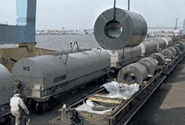Canada

July 5, 2023
Canada Feeling Impact of West Coast Port Strike
Written by Laura Miller
Port workers on Canada’s West Coast are on strike, and ports are already feeling the impact of the slowdown in the movement of goods.
![]()
More than 7,400 workers represented by the International Longshore and Warehouse Union Canada (ILWU Canada) took to the picket lines starting on July 1 after failing to reach a new labor agreement with the British Columbia Maritime Employers Association (BCMEA).
Twenty-nine ports along Canada’s West Coast are being impacted by the strike. Congestion is already being reported at the Port of Vancouver, British Columbia, the largest port in Canada and the fourth largest in North America.
ILWU Canada members are picketing various cargo and container handling sites, according to the Port of Vancouver.
“The strike action has disrupted the port operations and anchorage capacity,” the Port said in a statement on July 4. It has taken measures to try to maintain fluid operations, but the actions have not been “enough to prevent further congestion and delays,” it said as it asked industry to slow down vessels and adopt a near-time arrival process.
“While we can’t speculate on what the specific impacts may be, $1 of every $3 of Canada’s trade in goods outside of North America moves through the Port of Vancouver so any disruption to port operations has a significant impact globally and on Canadians who rely on the businesses that import and export goods through the port for employment and for reliable access to the products that support each of us every day,” a spokesman for the Port said in an email to SMU.
The BCMEA said the “ILWU Canada’s strike action has shut down operations at the vast majority of B.C.’s marine terminals … damaging supply chains across the country and immediately impacting Canadians and businesses.”
“We recognize the dire impact this ongoing strike is having on Canada’s economy and Canadians – we remain ready to reach a fair and balanced deal so ports can open, and goods can start flowing as soon as possible,” BCMEA said in a statement on July 4.
ILWU Canada said BCMEA walked away from the bargaining table but that the union remains open to talks. Negotiations resumed on July 2, supported by Canada’s Federal Mediation and Conciliation Service.
By Laura Miller, laura@steelmarketupdate.com






